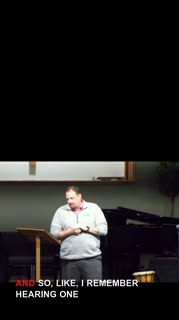Edifying the Church: Understanding Spiritual Gifts and Order
Devotional
Sermon Summary
Bible Study Guide
Sermon Clips
1) "So to make the most sense of this text, we really have to know a couple things. Number one, we have to know that Paul is using terms that he doesn't take time to define. Okay? We talked about a little bit of that with tongues last week. He's using terms that he hasn't really taken time to define. And the second thing we need to know is that we need to keep in mind the main point. The main point of chapters 12 through 14. That's what we're going to have to keep in mind. Okay? So let me talk about those two things by way of introduction really quickly here. First of all, how Paul uses his terms. And when it comes to prophecy, it's really not the same as Old Testament prophecy. It's just a completely different idea in many ways." [05:35] (40 seconds)
2) "And so, like, I remember hearing one preacher who very respected, I really respect this preacher, he once said something to the effect of, if you think that God is speaking to you, write it in the Bible because it belongs there because it's divine revelation. Otherwise, zip it. You know, I don't go that far, okay? Now, in all transparency, where am I at in that? I have, like, one foot in one of these ditches, okay? And that is that one I just mentioned before because I do believe that God has given us the Scriptures, and that's what we have to base, that's His revelation. I'm not as comfortable saying, though, that God doesn't do any type of direction or leading outside of the Scripture because, I mean, we know from Romans, one, that God uses even nature to communicate something." [08:34] (48 seconds)
3) "So the assumption is that we're going to gather together. So you, in talking about spiritual gifts, you're not going to fully use the gifts that God's given to you if you're not gathering together with other believers. Because the main point, as we said before, right, is the main point is all things should be done decently in order. the building up of the church, how are we going to do that for that gathering together? Okay, I need to move on because point number two is going to take a little bit longer to go through. So if the assumption was that we're going to gather together, the expectation is that all Christians are going to participate in those meetings." [20:56] (33 seconds)
4) "Our participation should contribute to the building of the church. That really is let all things, at the end of verse 26, let all things be done for building up. So it's not so much about just getting people active. It's not just so much about people starting to be busy and do busy work. That's not what the point is here. We're not just handing out jobs to keep people busy. It's the idea of building up the church. So what we need to ask ourselves is, is my participation in the gathering, is that intentionally being used to try to build the church up? To be a more healthy church? To be a church that represents Christ well? And to be a lighthouse in this community?" [25:26] (42 seconds)
5) "So any gifts that God's given to you, it has to be always with the mentality of, we've got to be building the church for Christ. We've got to be representing Christ well here. So our participation should contribute to the building of the church. But we see that in the text. But we also see in the text that our participation should follow the Lord's regulations for the church. So this is when we get into verse 27 and following. when he starts to say things like, okay, if any speak a tongue, let there be two or three, let there be only two or at the most three, and each in turn, let someone interpret. If there's no one to interpret, each of them keep silent in the church and speak himself to God." [29:24] (37 seconds)
6) "So what does he mean? So if he's made allowances or an expectation that women are going to be speaking in the church service in chapter 11, he's not talking about inferiority. Why in the world does he bring this up here? On first reading of it, it seems so out of place, doesn't it? When you're reading through it, it just seems like, whoa, where did that come from, you know, type thing. But actually, it fits really well when you understand what he's talking about here. See, what he's talking about here, so I said right idea, wrong execution. The right idea is for the prophecies to be evaluated publicly. That's what he's saying there. He said they got to be evaluated. That's what he's talking about there." [42:47] (41 seconds)
7) "So unhealthy autonomy is a danger to avoid. And a common example of unhealthy autonomy today would be, you know, well, you know, I made a decision and I have peace about it. And you have godly people telling you it's a bad idea. And you're like, well, I have peace about it. That's an example, a common one that I've had. I remember having someone sit in my office, a married person tell me that it was okay to leave their spouse. someone else because they had peace about it. It's okay. I have peace about it. I wish I would have thought to say at the time, I didn't at the time. I said something else. But I wish I would have thought to say at that time, you know, Jonah had a lot of peace when he was asleep in the boat as well." [49:50] (45 seconds)
8) "So again i come back to the main point here and the main point of this section here is this that all things should be done decently in order for the building up of the church so as we end this section and it has been a ride in this section i've enjoyed the study and the pushback and in the interaction and and and i welcome that that respectful dialogue and what about this and that is it's great you know as long as we come back to the scriptures and let the scriptures guide us here um you know where could we go wrong in this and applying this i'll tell you how we could go wrong we could go wrong if we stop prioritizing gathering together that's where we could go wrong we're not using our gifts if we're not gathering and we're hindering other people from using their gifts to the fullest extent when we don't gather together all the one and others in scriptures that that necessitates us being together okay so we could go wrong by not prioritizing the gathering together we could assume attendance is equal as as participation that would be another way we could go wrong well i show up okay but how are you participating who are you ministering to who are you trying to build up in the church it doesn't necessarily have to be in a public way but what conversations are you intentionally having with other people in the church to build them up okay how are you trying to use the gift in this and you don't need a program in the church to use your gifts by the way okay how are you using your gifts to build the church up just showing up does not necessarily equal participation so that's another way we could go wrong and then the last way we could go wrong is when we use our gifts for our own benefit and really with no regard of what's best for the church" [52:00] (102 seconds)
Ask a question about this sermon
2) "And so, like, I remember hearing one preacher who very respected, I really respect this preacher, he once said something to the effect of, if you think that God is speaking to you, write it in the Bible because it belongs there because it's divine revelation. Otherwise, zip it. You know, I don't go that far, okay? Now, in all transparency, where am I at in that? I have, like, one foot in one of these ditches, okay? And that is that one I just mentioned before because I do believe that God has given us the Scriptures, and that's what we have to base, that's His revelation. I'm not as comfortable saying, though, that God doesn't do any type of direction or leading outside of the Scripture because, I mean, we know from Romans, one, that God uses even nature to communicate something." [08:34] (48 seconds)
3) "So the assumption is that we're going to gather together. So you, in talking about spiritual gifts, you're not going to fully use the gifts that God's given to you if you're not gathering together with other believers. Because the main point, as we said before, right, is the main point is all things should be done decently in order. the building up of the church, how are we going to do that for that gathering together? Okay, I need to move on because point number two is going to take a little bit longer to go through. So if the assumption was that we're going to gather together, the expectation is that all Christians are going to participate in those meetings." [20:56] (33 seconds)
4) "Our participation should contribute to the building of the church. That really is let all things, at the end of verse 26, let all things be done for building up. So it's not so much about just getting people active. It's not just so much about people starting to be busy and do busy work. That's not what the point is here. We're not just handing out jobs to keep people busy. It's the idea of building up the church. So what we need to ask ourselves is, is my participation in the gathering, is that intentionally being used to try to build the church up? To be a more healthy church? To be a church that represents Christ well? And to be a lighthouse in this community?" [25:26] (42 seconds)
5) "So any gifts that God's given to you, it has to be always with the mentality of, we've got to be building the church for Christ. We've got to be representing Christ well here. So our participation should contribute to the building of the church. But we see that in the text. But we also see in the text that our participation should follow the Lord's regulations for the church. So this is when we get into verse 27 and following. when he starts to say things like, okay, if any speak a tongue, let there be two or three, let there be only two or at the most three, and each in turn, let someone interpret. If there's no one to interpret, each of them keep silent in the church and speak himself to God." [29:24] (37 seconds)
6) "So what does he mean? So if he's made allowances or an expectation that women are going to be speaking in the church service in chapter 11, he's not talking about inferiority. Why in the world does he bring this up here? On first reading of it, it seems so out of place, doesn't it? When you're reading through it, it just seems like, whoa, where did that come from, you know, type thing. But actually, it fits really well when you understand what he's talking about here. See, what he's talking about here, so I said right idea, wrong execution. The right idea is for the prophecies to be evaluated publicly. That's what he's saying there. He said they got to be evaluated. That's what he's talking about there." [42:47] (41 seconds)
7) "So unhealthy autonomy is a danger to avoid. And a common example of unhealthy autonomy today would be, you know, well, you know, I made a decision and I have peace about it. And you have godly people telling you it's a bad idea. And you're like, well, I have peace about it. That's an example, a common one that I've had. I remember having someone sit in my office, a married person tell me that it was okay to leave their spouse. someone else because they had peace about it. It's okay. I have peace about it. I wish I would have thought to say at the time, I didn't at the time. I said something else. But I wish I would have thought to say at that time, you know, Jonah had a lot of peace when he was asleep in the boat as well." [49:50] (45 seconds)
8) "So again i come back to the main point here and the main point of this section here is this that all things should be done decently in order for the building up of the church so as we end this section and it has been a ride in this section i've enjoyed the study and the pushback and in the interaction and and and i welcome that that respectful dialogue and what about this and that is it's great you know as long as we come back to the scriptures and let the scriptures guide us here um you know where could we go wrong in this and applying this i'll tell you how we could go wrong we could go wrong if we stop prioritizing gathering together that's where we could go wrong we're not using our gifts if we're not gathering and we're hindering other people from using their gifts to the fullest extent when we don't gather together all the one and others in scriptures that that necessitates us being together okay so we could go wrong by not prioritizing the gathering together we could assume attendance is equal as as participation that would be another way we could go wrong well i show up okay but how are you participating who are you ministering to who are you trying to build up in the church it doesn't necessarily have to be in a public way but what conversations are you intentionally having with other people in the church to build them up okay how are you trying to use the gift in this and you don't need a program in the church to use your gifts by the way okay how are you using your gifts to build the church up just showing up does not necessarily equal participation so that's another way we could go wrong and then the last way we could go wrong is when we use our gifts for our own benefit and really with no regard of what's best for the church" [52:00] (102 seconds)







